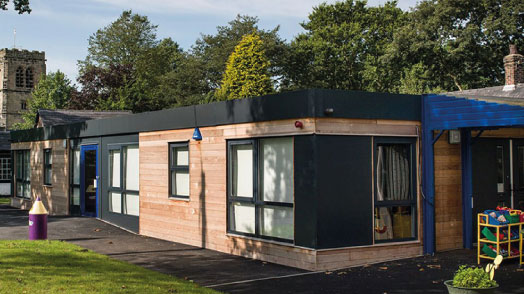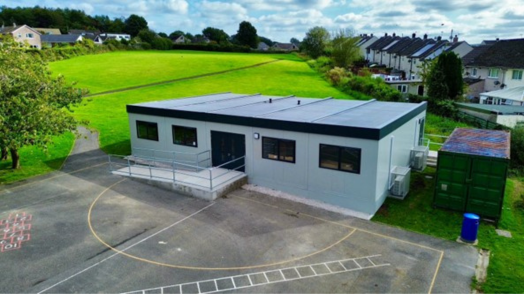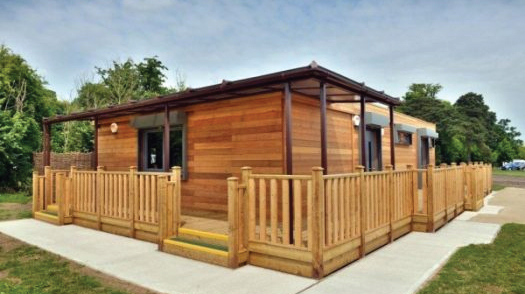Contact our friendly team for more information on our full range of buildings and how to start the process of hiring or buying a modular building for your business. Our expert team is always available to give advice, guidance or support.
Published: 30 January 2024 in Building Types
What’s the Difference Between Traditional and Offsite Construction?

The traditional brick-and-mortar building method has been around for centuries and has cemented itself as the backbone of the construction industry. However, over the last few decades, the industry has seen significant changes, with off-site modular construction gaining popularity for its potential to reduce costs, project timelines, and environmental impact.
Choosing between traditional and off-site construction will depend on your project’s objectives and budget, and understanding the primary differences between these two construction methods is the key to making the right decision.
This article outlines the differences between traditional and off-site construction.
What is Traditional Construction?
Traditional construction is the process of assembling a building on-site, with each aspect of the project occurring sequentially. This method uses raw materials and follows the conventional stage-by-stage process, working from the foundations up.
What is Off-site Construction?
Also known as modular or prefabricated construction, off-site construction is a building approach where components are manufactured in a controlled factory environment before being transported and assembled on-site.
With off-site construction, the groundwork on-site and the prefabrication of the building’s components off-site occur simultaneously.
What’s the Difference Between Traditional and Off-site Construction?
Cost
The cost implications of traditional construction methods versus off-site construction are significant and can impact various aspects of a project.
Off-site construction involves assembling modules in a controlled factory environment, often requiring fewer labour resources than on-site construction. Traditional construction typically requires a substantial labour force for various tasks such as excavation, foundation work, and finishing. The extended duration of traditional construction can result in higher labour costs and longer build times, impacting the overall budget.
Overall, the controlled environment of off-site construction contributes to more accurate cost estimations, making it easier for project managers to stay within budget constraints.
Speed
Time-saving directly translates to cost savings, especially in projects with tight schedules, as it minimises financing costs and accelerates the overall return on investment.
Prefabrication can significantly reduce construction timelines. Simultaneously designing and manufacturing modules in the factory and preparing the foundations on-site creates a more streamlined and time-efficient construction process.
Traditional construction is a complete on-site procedure and thus requires time to complete every construction step. Projects using traditional methods often take longer due to weather delays, on-site coordination challenges, reliance on contractors, and sequential construction processes.
Quality
Off-site construction allows for stringent quality control measures in a factory setting. Each module can be manufactured to exact specifications, reducing the likelihood of errors or defects. This high level of quality control can lead to fewer rework expenses once on-site.
With traditional construction, ensuring consistent quality across all aspects of the project can be more challenging due to variations in workmanship, unpredictable weather conditions, and the on-site nature of the construction process, which may cause delays.
Environmental Impact
The energy-intensive processes involved in traditional construction, including transportation of materials to the construction site, on-site machinery, and manufacturing processes, contribute to high energy consumption and carbon emissions.
Off-site construction allows for precise planning and optimisation of material usage, resulting in minimal waste and reduced environmental impact.
While both off-site and traditional construction methods have environmental implications, off-site construction generally offers material efficiency and energy consumption advantages, making it a more environmentally sustainable option in many cases.
Adaptability
Off-site modular construction generally offers greater adaptability and flexibility than traditional on-site construction.
Due to the concurrent nature of the off-site construction process, architects can make last-minute design changes and functional adaptations more easily.
However, on the other hand, on-site construction allows for renovations and additions to existing structures that off-site construction does not.
Disruption
Traditional construction methods typically cause disruptions to surrounding areas. Excessive site traffic, loud machinery, and inconvenient road closures can negatively affect businesses and local communities.
Since most off-site construction occurs in a controlled factory environment, and only prefabricated modules are assembled on-site, disturbances are minimised, contributing to a smoother construction process.
It’s important to acknowledge that traditional construction remains fundamental to the industry and undoubtedly still has its place. However, off-site construction methods offer accuracy, speed, and cost savings that cannot be ignored.









